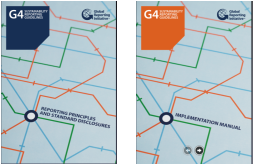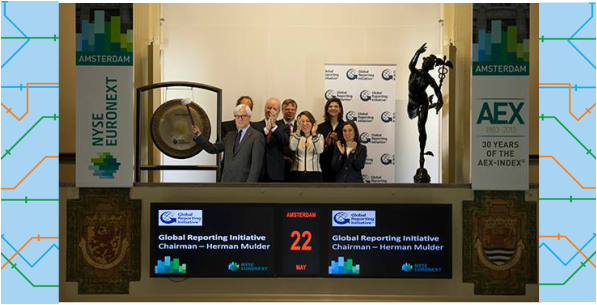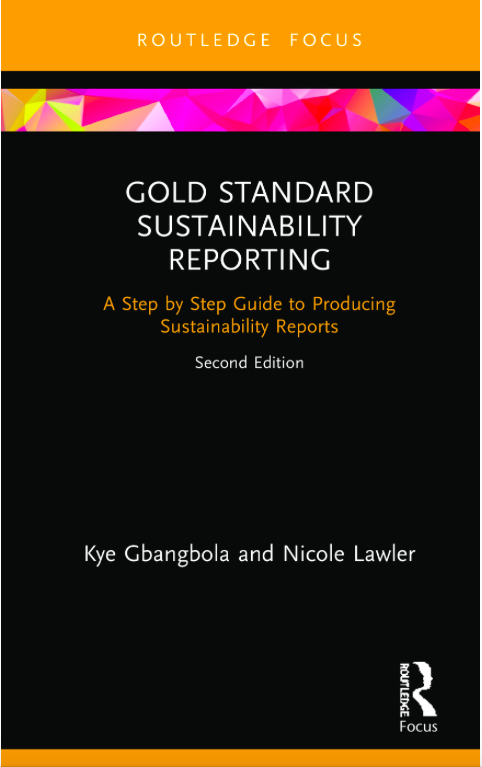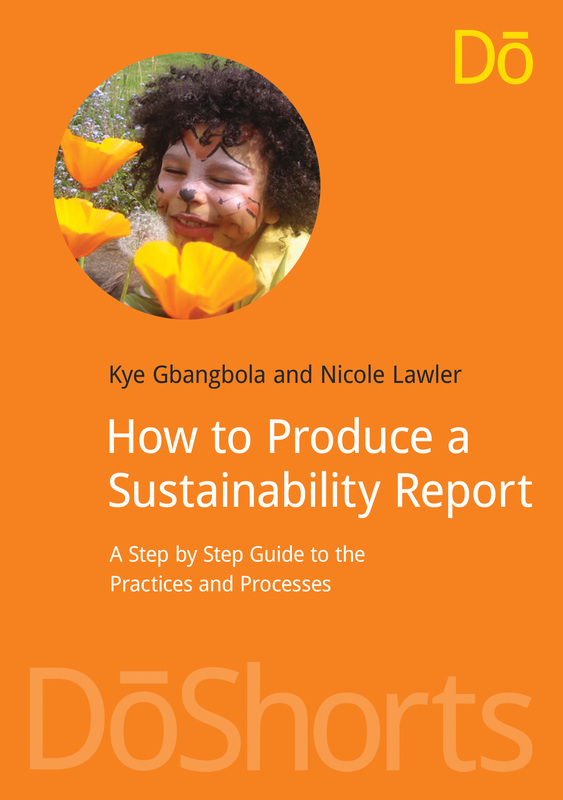The Global Reporting Initiative (GRI) launched the latest version of its sustainability reporting guidance; called the G4, at the Amsterdam Stock Exchange in May.
Due to the success of earlier versions of the standard it is likely to be a busy time for GRI as more and more organisations recognise the benefits sustainability reporting brings.
G4 is the upgrade to G3 and G3.1. It is the result of a two-year multi-stakeholder dialogue process involving over 80 workshops, 2000 participants, resulting in over 3,500 pages of written feedback which was analyzed, categorized, embraced, adopted or discarded. G4 was heralded as the tool, which will separate the irrelevant from the important, the inputs from the impacts and the trivial from the material.
G4 is an ‘in accordance with’ standard with 2 options, ‘Core’, and ‘Comprehensive’, both focused on quality of reporting, rather than extent of reporting. It frees organisations to report only on what is ‘material’ to generate concise reports based on the creation of value, sustainable growth, and long term resilience. G4’s systematic approach requires greater integration between organisational functions and their supply chains.
The following are the main questions to consider:
Who should report to G4? All organisations. MNE, ‘Brands’, SME’s, voluntary, charitable, private and public, there are even many micro organisations that report. A common factor in reporters is a culture that seeks to improve society long term.
Will G3 and 3.1 cease to be valid? Yes at December 2015
What do organisations now have to report? As the GRI 3.1 reporting standard, but there is a greater choice of indicators with G4. The Aspects reported on include the following; Materials, Energy, Water, Biodiversity, Carbon (GHG Protocol scope 1, 2, 3 and intensity), Waste, Effluence, Sourcing, Supply Chain, Procurement Standards, Economic Value, Management Relations, Gender, Remuneration, Corruption, Design Standards, Community, Health & Safety, Labour Practices, Training and Education, Human Rights, Product Standards, Local Community, Compliance, and Fines etc.
Is Assurance required? Yes; it continues to be recommended, but the ‘+’ has gone because some organisations misused it. However Assurance has been reinforced by a requirement for reports to identify every disclosure that is covered in an assurance. The new arrangements add value to stakeholders keen for assurance to provide greater credibility and trust. Ideally assurers should be competent on GRI Frameworks and their operation.
When can organisations start using the G4? As of its launch 22nd May 2013.
What knowledge is needed? Training in the G4 covers how to prepare the reporting process, navigate the challenges, prioritise stakeholders, build relationships through engagement, and focus on the material using consistent metrics that are common and comparable, and used by organisations all over the world. Total Eco Management (TEM) can show organisations how to develop practice, write a report, get it assured to optimise its value.
Example reports? Visit the GRI Data Partners for the UK at GRI Data Partners.
How does G4 relate to other environmental and sustainability standards? GRI has formal 'linkage documents'; which provide guidance for using GRI reporting in combination with other standards such as IIRC CDP, ISO Standards, UN Global Compact, UK Mandatory GHG Reporting 2013, and OECD. G4 operates in harmony with many other international reporting standards. What documents are needed to report? There are 2 main Sustainability Reporting Guidance documents, Part 1; ‘G4 Reporting Principles and Standard Disclosures’; details ‘what’ the G4 expects of organisations. Part 2; ‘G4 Implementation Manual’, details ‘how’, to implement the G4.
Does reporting provide any benefit to organisations? Organisations that disclose are best positioned to manage their environmental impact risks and opportunities. Many studies have proven the value of reporting evidencing how reputation and brand are enhanced, risks and cost are reduced, income is enhanced, compliance with legislation is improved, a long with staff attraction and retention. PWC and Deutsche Bank studies confirm the cost of capital reduces to reporting organisations. Leaders understand there is no conflict between resource conversation and profit.
Do many places Mandate for reporting? Companies are reporting out of the need to compete, business failure and the need to respond and stay in business, and of course legislative shift. The European Commission accounting legislation will soon mandate the reporting of environmental social governance for up to 18,000 large companies, placing Europe in a leadership position on corporate accountability. In addition more than 13 Stock Exchanges require all their listed companies’ to sustainability report. A further 10 governments are demanding companies report, and in the UK the Mandatory Reporting Guidance, April 2013, sets GRI as a recommended methodology.
GRI is a collaboration and a public for good seeking to generate a sustainable global economy. The world knows its time to act, and act fast. Organisations should all strive to race for the top and be glad of the availability of a common and consistent framework where organisations are free to choose those elements that are material. There are a surprising number of organisations that still report to the older G3 standard but now we have the more user friendly G4 and GRI are keen for organisations to train and upgrade to it as soon as possible.
New Software to ease the process of G4 reporting will also soon be available. Contact TEM to find out more.
from → Kye Gbangbola is Consultancy, Training and Assurance lead at TEM
|
0 Comments
 "The G4 Guidelines have increased user-friendliness and accessibility. They are presented in two interconnected parts: Links to part 1 and part 2. Internal links help the reader navigate through the documents. The emphasis on what is material encourages organizations to provide only information that is critical to their business and stakeholders. This means organizations and report users can concentrate on the sustainability impacts that matter, resulting in reports that are more strategic, more focused, more credible, and easier for stakeholders to navigate. AMONG MANY OTHER FEATURES, KEY ENHANCEMENTS IN G4 INCLUDE: New: up-to-date disclosures on governance, ethics and integrity, supply chain, anti-corruption and GHG emissions New: generic format for Disclosures on Management Approach New: two ‘in accordance’ criteria options, both focused on material Aspects New: GRI Content Index offering a transparent format to communicate external assurance Technically-reviewed content and clear disclosure requirements Detailed guidance on how to select material topics, and explain the boundaries of where material impacts occur Flexibility for preparers to choose the report focus Flexibility to combine with local and regional reporting requirements and frameworks Up-to-date harmonization and reference to all available and internationally-accepted reporting documents Overview tables, summaries and quick links to specific Guidelines’ components Complete Glossary, reference lists, and visual guidance from → GRI The latest evolution of the Global Reporting Initiative’s Sustainability Reporting Guidelines – G4 – was approved by GRI’s Board of Directors last month. The G4 Guidelines will be launched later this month at the Global Conference on Sustainability Reporting before an audience of 1500 leaders and practitioners from around the globe.
The GRI Guidelines enable all companies and organizations to report on their economic, environmental, social and governance performance. G4 has been significantly revised and enhanced in order to reflect important current and future trends in the sustainability reporting landscape. In addition to enhancing the relevance and quality of standalone sustainability reports, G4 will be a powerful framework for generating material sustainability information for inclusion in integrated reports. GRI Chief Executive Ernst Ligteringen said: “Today, sustainability reporting is rapidly becoming the norm for large companies in many parts of the world. Some 95 per cent of the world’s largest 250 companies now produce a sustainability report, and four out of five of these choose to use the GRI Guidelines. “As this strong upward trend in reporting continues, we will see many more companies of all sizes and sectors embracing transparency and accountability. Sustainability reporting will become a key enabler for an ever wider range of stakeholders, including investors, governments and market regulators. G4 is designed to be relevant to all these groups and to the many new reporters coming on stream.” |
AuthorNicole Lawler NEW RELEASE
|
















 RSS Feed
RSS Feed
